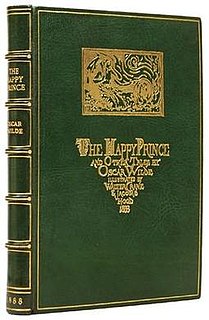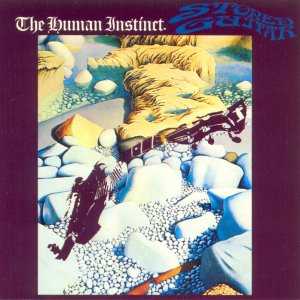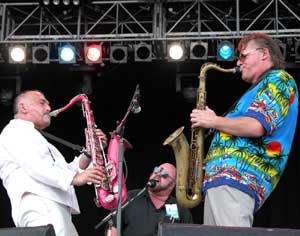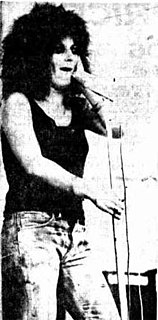
The Happy Prince and Other Tales is a collection of stories for children by Oscar Wilde first published in May 1888. It contains five stories: "The Happy Prince", "The Nightingale and the Rose", "The Selfish Giant", "The Devoted Friend", and "The Remarkable Rocket".
Spectrum are an Australian progressive rock band which formed in April 1969 and broke up in April 1973. The original line-up was Mark Kennedy on drums, Lee Neale on organ (ex-Nineteen87), Bill Putt on bass guitar, and Mike Rudd on guitar and lead vocals. In August 1970 Kennedy was replaced by Ray Arnott on drums. These members also performed under the alter ego, Indelible Murtceps, from 1971 to 1973. Spectrum had a number-one hit, "I'll Be Gone", on the Go-Set National Top 60 singles chart. After Spectrum and Indelible Murtceps disbanded, Putt and Rudd formed Ariel. In 1999 the pair formed Spectrum Plays the Blues, which later trimmed their name back to Spectrum. On 7 August 2013 Bill Putt died, after a heart attack.

Michael David Rudd is a New Zealand-born musician and composer who has been based in Australia since the late 1960s, and who was the leader of Australian progressive rock bands Spectrum and Ariel in the 1970s.

Ross Andrew Wilson is an Australian singer-songwriter, musician and producer. He is the co-founder and frontman of the long-standing rock groups Daddy Cool and Mondo Rock, as well as a number of other former bands, in addition to performing solo. He has produced records for bands such as Skyhooks and Jo Jo Zep & the Falcons, as well as for those of his own bands. He appeared as a judge on celebrity singing TV series It Takes Two from 2005. Wilson was individually inducted into the Australian Recording Industry Association (ARIA) Hall of Fame in 1989 and again as a member of Daddy Cool in 2006.
The Happy Prince may refer to:
Kevin Nicholas Borich is a New Zealand-born Australian guitarist and singer-songwriter. He was a founding member of The La De Das, the leader of Kevin Borich Express, and a founding member of The Party Boys, as well as a session musician for numerous acts.
The Wild Cherries was an Australian rock group, which started in late 1964 playing R&B/jazz and became "the most relentlessly experimental psychedelic band on the Melbourne discotheque / dance scene" according to commentator, Glenn A. Baker.

Sunbury Pop Festival or Sunbury Rock Festival was an annual Australian rock music festival held on a 620-acre (2.5 km2) private farm between Sunbury and Diggers Rest, Victoria, which was staged on the Australia Day long weekend from 1972 to 1975. It attracted up to 45,000 patrons and was promoted by Odessa Promotions, which was formed by a group of television professionals, including John Fowler, from GTV 9 Melbourne.
Procession were an Australian psychedelic pop, jazz band, formed in October 1967 by Craig Collinge on drums, Trevor Griffin on organ, Brian Peacock on bass guitar and vocals, Mick Rogers on lead guitar and lead vocals. They relocated to London in mid-1968 and released a self-titled studio album in the following year. Australian singer-songwriter, Ross Wilson took over on lead vocals in April 1969 but the group disbanded in September. Rogers later joined Manfred Mann's Earth Band, Collinge was later a member of British proto-punk band, Third World War, and briefly played drums in the notorious "fake" Fleetwood Mac in 1973. Wilson was later a member of Daddy Cool and a record producer, he was inducted into the ARIA Hall of Fame as a solo artist in 1989 and as a member of Daddy Cool in 2006.

"I'll Be Gone" or "Some Day I'll Have Money" is a song by Australian progressive rock group Spectrum released as their debut single by EMI on Harvest Records in January 1971. It peaked at #1 on the national singles chart, while it reached Top 5 in Melbourne, Sydney and Brisbane. The song was written by guitarist and vocalist Mike Rudd, and produced by Howard Gable. The B-side, "Launching Place Part Two" was written to promote a music festival. Spectrum never repeated the success of "I'll Be Gone".
Ross Andrew Hannaford was an Australian musician, active in numerous local bands. He was often referred to by his nickname "Hanna". Widely regarded as one of the country's finest rock guitarists, he was best known for his long collaboration with singer-songwriter Ross Wilson, which began as teenagers, with The Pink Finks and forming the seminal early '70s Australian rock band Daddy Cool. Hannaford died of cancer after being diagnosed a year earlier.
The La De Da's were a New Zealand rock band of the 1960s and early 1970s. Formed in New Zealand in 1963 as the Mergers, they had considerable success in both New Zealand and Australia until their split in 1975.

Stoned Guitar is the second album by New Zealand blues-rock band The Human Instinct. It was released in 1970. The cover features an adaptation of a painting by New Plymouth artist Michael Smither, "Two Rock Pools".
Band of Light were an Australian blues rock quartet formed in October 1972 by Tony Buettel on drums, Phil Key on lead vocals and guitar, Peter Roberts on bass guitar and Norm Roue on slide guitar. Roberts was soon replaced by Ian Rilen on bass guitar. They had a top 20 hit single, "The Destiny Song" on the Go-Set National Charts. The group released two albums, Total Union – which peaked at No. 13 – and The Archer (1974) before disbanding in late 1974. Phil Key died in May 1984 of a congenital heart condition; Ian Rilen died of bladder cancer in October 2006.

Jo Jo Zep and the Falcons are an Australian blues and rock music band that features the singer, songwriter and saxophonist Joe Camilleri. The band was active in the late 1970s and early 1980s, and had several Australian chart hits including "Hit and Run", "Shape I'm In" and "All I Wanna Do". The Falcons dissolved in 1981 and the group's biggest Australian hit, 1982's "Taxi Mary", as well as the New Zealand top ten hit "Walk on By", were both credited simply to "Jo Jo Zep". In 1983, Camilleri and other members of the Falcons formed the Black Sorrows.

It's 2 Easy is the second studio album Australian rock band the Easybeats. Released on 24 March 1966, the album featured four hit singles; "Wedding Ring", "Sad and Lonely and Blue", "Women " and "Come And See Her".
Daddy Cool are an Australian rock band formed in Melbourne, Victoria in 1970 with the original line-up of Wayne Duncan, Ross Hannaford, Ross Wilson and Gary Young. Their debut single "Eagle Rock" was released in May 1971 and stayed at number 1 on the Australian singles chart for ten weeks. Their debut July 1971 LP Daddy Who? Daddy Cool also reached number 1 and became the first Australian album to sell more than 100,000 copies. The group's name came from the 1957 song "Daddy Cool" by US rock group The Rays. Daddy Cool included their version of this song on Daddy Who? Daddy Cool.

Wendy June Saddington, also known as Gandharvika Dasi, was an Australian blues, soul and jazz singer, and was in the bands Chain, Copperwine and the Wendy Saddington Band. She wrote for teen pop newspaper Go-Set from September 1969 to September 1970 as an agony aunt in her weekly "Takes Care of Business" column, and as a feature writer. Saddington had Top 30 chart success with her 1972 solo single "Looking Through a Window", which was written and produced by Billy Thorpe and Warren Morgan of the Aztecs. After adopting Krishna Consciousness in the 1970s she took the name Gandharvika Dasi. In March 2013 she was diagnosed with oesophageal cancer, and died on 21 June, aged 63.
Leo de Castro was a New Zealand funk and soul singer-guitarist. From 1969 to 1995 he worked in Australia in a variety of bands before returning to Auckland. He contributed to Rocco (1976), as a member of Johnny Rocco Band; Voodoo Soul – Live at The Basement, by Leo de Castro and Friends; a live album, Long White Clouds (2007), which had been recorded in January 1988 using two separate backing bands, The Dancehall Racketeers and Roger Janes Band.
Psychedelic rock in Australia and New Zealand is the psychedelic rock music scene in Australia and New Zealand.









